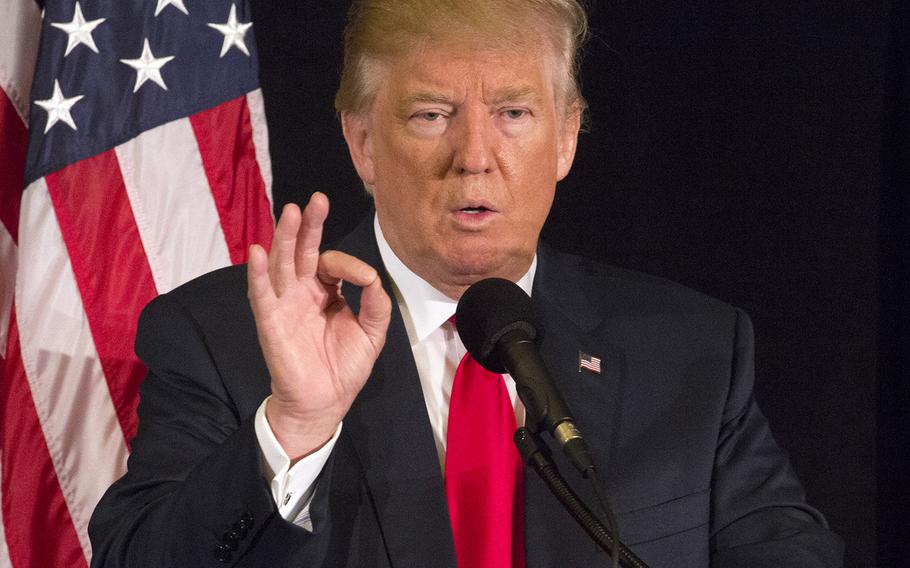
Republican presidential candidate Donald Trump speaks at a Retired American Warriors PAC event in Herndon, Va., Oct. 3, 2016. (Joe Gromelski/Stars and Stripes)
Republican presidential nominee Donald Trump on Monday told an audience of veterans that “a lot of people can’t handle” post-traumatic stress, igniting controversy on the sticking points of discussing mental health among troops and veterans.
“People come back from war and combat, and they see things that maybe a lot of the folks in this room have seen many times over,” Trump said during a question-and-answer session with Retired American Warriors, a political action committee, in Herndon, Va.
“And you’re strong and you can handle it, but a lot of people can’t handle it,” he said.
The remarks touched off charged discussion among veterans and veterans’ advocates taking two different positions: Trump appearing to characterize veterans with PTSD as weak on one hand, and Trump indelicately describing the complexities of trauma that could lead to avoidance of help on the other.
“It’s not helpful to suggest PTSD affects only the weak, and it undermines the work of the veteran community to fight mental health stigma,” said Kate Hoit, and Iraq veteran and communications director of Got Your Six, a veterans advocacy group.
“In reality it takes strength to acknowledge issues and seek help,” she said.
Phillip Carter, an Iraq veteran who researches veterans issues, said Monday that strength and weakness are irrelevant when it comes to whether someone develops PTSD after experiencing trauma.
“Trump's comments regarding PTSD demonstrate an appalling lack of empathy and leadership for someone running to be Commander in Chief, responsible for the lives of 2.4 million active and reserve servicemembers, as well as providing care and support for the nation's 22 million veterans,” he said.
Trump adviser retired Army Lt. Gen. Michael Flynn defended the nominee’s remarks Monday.
“Mr. Trump was highlighting the challenges veterans face when returning home after serving their country,” he said in a statement released by the Trump campaign. “He has always respected the service and sacrifice of our military men and women — proposing reforms to Veteran Affairs to adequately address the various issues veterans face when they return home.”
Later in his remarks, Trump said he would have a “very robust level of performance” at the VA in his administration, offering few details.
He also incorrectly repeated the number of veteran suicides at 22 a day, a figure that has been disputed by veterans groups due to uneven collection of data from less than half of states nationwide.
A VA study released in July lowered the figure to 20 a day — a number that shows deeper data analysis and not necessarily a decline in suicides.
One VA resource page of PTSD facts ends with “Getting help for PTSD is problem solving, not a sign of weakness.”
Twitter lit up after Trump's PTSD remarks.
“I mean, I guess by reinforcing stigma (strong soldiers don’t get PTSD!), he’s doing his part to keep those VA lines short!” tweeted Ana Marie Cox, a political and culture columnist at MTV News and New York Times Magazine. Cox, with 1.3 million followers on Twitter, drove commentary early on.
Eduardo Colon replied to Cox, saying “Vet with PTSD here -- I can’t wait for this election to be over with -- hopefully trump will disappear.”
Other veterans offered restraint over the comments. “Trump isn’t even close to enlightened on mental health issues. But hard to watch that and think he was implying PTSD sufferers are weak,” tweeted Max Rosenthal, an Army veteran and a reporter with Mother Jones.
horton.alex@stripes.com Twitter: @AlexHortonTX